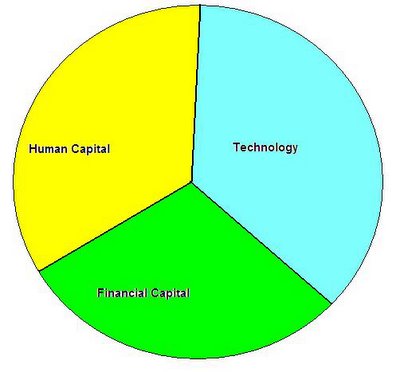
I have struggled to recoincile three issues: education, health and free trade. (Takes Two Arms And Two Legs To Swim)
- US faces daunting challenges in Latin America Xinhua, China
- Bush Arrives in Brazil, Faces More Opposition to Trade Proposal Bloomberg
- Leaders deadlocked over free trade zone Scotsman, United Kingdom
- Leaders Fail to Agree on Free Trade Talks ABC News
- Bush's trade initiative picks up little steam in Argentina San Jose Mercury News, United States
- Rioters shatter Bush's hopes of forging free trade coup The Observer, UK
- Summit's protesters claim victory Scotland on Sunday, UK
Free trade is sound economic theory. But its political application has been failing. In the American context, the Republicans push for free trade and vigorously work against both education and health. The Democrats are not creative and bold enough on education and health.
The diagram above is my way of saying the economy, be it micro, macro, or globo, has three broad components. Financial capital, physical capital, and human capital. So far the free traders have only been concerned about the financial capital part. The most ignored has been the human capital part. That fundamental imbalance hurts the cause of free trade.
There are several aspects to the human capital part. Education and health are the obvious ones. But there should also be talk of migration. The rich countries should be more welcoming of immigrants. Labor mobility has to be better channelled.
Another is the politics of farm subsidies. Free trade asks for those to be reduced and finally ended in the rich countries. But so far the rich countries have been resisting for political reasons.
So I don't think if the question is if free trade is good or bad. The question is are the political aspects of free trade being handled well. Short answer: no.
And when you expand free trade onto countries that have autocratic, unresponsive governments, you end up with multi-nationals looting the local resources and giving back little in return. Spread of democracy is key to the future of free trade.
